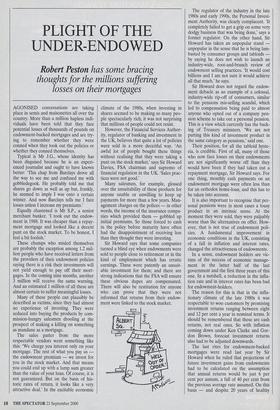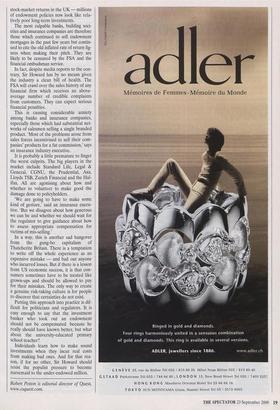PLIGHT OF THE UNDER-ENDOWED
Robert Peston has some bracing
thoughts for the millions suffering losses on their mortgages
AGONISED conversations are taking place in semis and maisonettes all over the country. More than a million hapless indi- viduals have been told that they face potential losses of thousands of pounds on endowment-backed mortgages and are try- ing to remember whether they were conned when they took out the policies or whether they conned themselves.
Typical is Mr J.G., whose identity has been disguised because he is an experi- enced journalist and ought to have known better: 'This chap from Barclays drove all the way to see me and confused me with gobbledegook. He probably told me that shares go down as well as up but, frankly, he seemed to imply I was onto a certain winner. And now Barclays tells me I face losses unless I increase my premiums.'
Equally chastened is Mr S.P., a senior merchant banker. 'I took out the endow- ment in 1988. It was cheaper than a repay- ment mortgage and looked like a decent punt on the stock market. To be honest, I feel a bit foolish.'
These chumps who misled themselves are probably the exception among 1.2 mil- lion people who have received letters from the providers of their endowment policies saying there is a risk their investments will not yield enough to pay off their mort- gages. In the coming nine months, another 3 million will receive the same warning. And an estimated 1 million of all these are almost certain to suffer meaningful losses.
Many of these people can plausibly be described as victims, since they had almost no experience of investing. They were seduced into buying the products by com- mission-hungry salesmen drooling at the prospect of making a killing on something as mundane as a mortgage.
The sales patter from the more respectable vendors went something like this: 'We charge you interest only on your mortgage. The rest of what you pay us the endowment premium — we invest for you in the stock market. And that means you could end up with a lump sum greater than the value of your loan. Of course, it is not guaranteed. But on the basis of his- toric rates of return, it looks like a very attractive deal.' In the excitable economic climate of the 1980s, when investing in shares seemed to be making so many peo- ple spectacularly rich, it was not surprising that millions of people could not resist.
However, the Financial Services Author- ity, regulator of banking and investment in the UK, believes that quite a lot of policies were sold in a more deceitful way. 'An awful lot of people bought these things without realising that they were taking a punt on the stock market,' says Sir Howard Davies, FSA chairman and supremo of financial regulation in the UK. 'Sales prac- tices were not good.'
Many salesmen, for example, glossed over the unsuitability of these products for anyone unable or unwilling to keep up payments for more than a few years. Man- agement charges on the polices — in other words, the income of the insurance compa- nies which provided them — gobbled up initial premiums. So those forced to cash in the policy before maturity have often had the disappointment of receiving less than they thought they were investing.
Sir Howard says that some companies turned a blind eye when endowments were sold to people close to retirement or in the kind of employment which has erratic earnings. These were patently an unsuit- able investment for them; and there are strong indications that the FSA will ensure these obvious dupes are compensated. There will also be restitution for anyone who can prove that they were not informed that returns from their endow- ment were linked to the stock market. The regulator of the industry in the late 1980s and early 1990s, the Personal Invest- ment Authority, was clearly complacent. 'It completely failed to get a grip on some very dodgy business that was being done,' says a former regulator. On the other hand, Sir Howard has taken an unpopular stand unpopular in the sense that he is being lam- basted by consumer groups and tabloids by saying he does not wish to launch an industry-wide, root-and-branch review of endowment selling practices. 'It would cost billions and I am not sure it would achieve all that much,' he says.
Sir Howard does not regard the endow- ment debacle as an example of a colossal, industry-wide rip-off of consumers, similar to the pensions mis-selling scandal, which led to compensation being paid to almost anyone who opted out of a company pen- sion scheme to take out a personal pension. This is a view which currently has the back- ing of Treasury ministers. 'We are not putting this kind of investment product in the same category as pensions,' said one.
Their position, for all the tabloid hyste- ria, is credible. First of all, many of those who now face losses on their endowments are not significantly worse off than they would have been if they had taken out a repayment mortgage, Sir Howard says. For one thing, monthly cash payments on an endowment mortgage were often less than for an orthodox home-loan, and this has to be taken into account.
It is also important to recognise that per- sonal pensions were in most cases a lousy product in an intrinsic sense. At the moment they were sold, they were palpably worse than the alternatives on offer. How- ever, that is not true of endowment poli- cies. A fundamental improvement in economic conditions in the UK, consisting of a fall in inflation and interest rates, changed the attractiveness of endowments.
In a sense, endowment holders are vic- tims of the success of economic manage- ment in the latter half of the last government and the first three years of this one. In a nutshell, a reduction in the infla- tion rate and in interest rates has been bad for endowment-holders.
The reason for this is that in the infla- tionary climate of the late 1980s it was respectable to woo customers by promising investment returns ranging between eight and 12 per cent a year in nominal terms. It should be remembered that these are cash returns, not real ones. So with inflation coming down under Ken Clarke and Gor- don Brown, forecast investment returns also had to be adjusted downwards.
The last rites for endowment-backed mortgages were read last year by Sir Howard when he ruled that projections of future investment gains from endowments had to be calculated on the assumption that annual returns would be just 6 per cent per annum, a fall of 40 per cent from the previous average rate assumed. On this basis — and despite 20 years of healthy stock-market returns in the UK — millions of endowment policies now look like rela- tively poor long-term investments.
The most culpable banks, building soci- eties and insurance companies are therefore those which continued to sell endowment mortgages in the past few years but contin- ued to cite the old inflated rate of return fig- ures when making their pitch. They are likely to be censured by the FSA and the financial ombudsman service, In fact, despite media reports to the con- trary, Sir Howard has by no means given the industry a clean bill of health. The FSA will crawl over the sales history of any financial firm which receives an above- average number of credible complaints from customers. They can expect serious financial penalties.
This is causing considerable anxiety among banks and insurance companies, especially those which had substantial net- works of salesmen selling a single branded product. 'Most of the problems arose from sales forces incentivised to sell their com- panies' products for a fat commission,' says an insurance industry executive.
It is probably a little premature to finger the worst culprits. The big players in the market include Standard Life, Legal & General, CGNU, the Prudential, Axa, Lloyds TSB, Zurich Financial and the Hal- ifax. All are agonising about how and whether to volunteer to make good the damage done to policyholders.
`We are going to have to make some kind of gesture,' said an insurance execu- tive. 'But we disagree about how generous we can be and whether we should wait for the regulator to give guidance about how to assess appropriate compensation for victims of mis-selling.'
In a way, this is another sad hangover from the gung-ho capitalism of Thatcherite Britain. There is a temptation to write off the whole experience as an expensive mistake — and bail out anyone who incurred losses. But if there is a lesson from US economic success, it is that con- sumers sometimes have to be treated like grown-ups and should be allowed to pay for their mistakes. The only way to create a genuine risk-taking culture is for people to discover that certainties do not exist.
Putting this approach into practice is dif- ficult for politicians and regulators. It is easy enough to say that the investment banker who took out an endowment should not be compensated because he really should have known better, but what about the university-educated primary school teacher?
Individuals learn how to make sound investments when they incur real costs from making bad ones. And for that rea- son, if for no other, Sir Howard should resist the populist pressure to become nursemaid to the under-endowed million.
Robert Peston is editorial director of Quest, www. csquest. corn.























































































 Previous page
Previous page